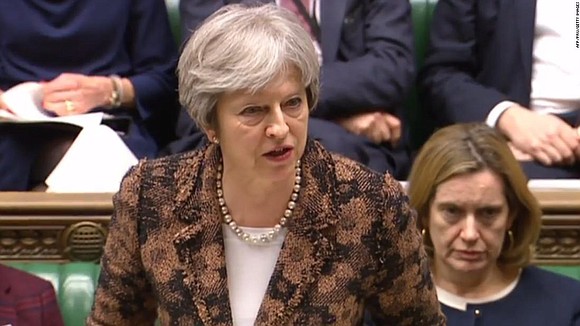Theresa May sets date for vote on Brexit deal, rejects second referendum
CNN/Stylemagazine.com Newswire | 12/17/2018, 10:53 a.m.
By Bianca Britton and James Griffiths, CNN
(CNN) -- British Prime Minister Theresa May told the House of Commons on Monday that Parliament's delayed vote on her Brexit deal will be held the week beginning January 14, 2019.
Speaking to lawmakers, May confirmed that the manner of the UK's exit from the European Union would be debated the week commencing January 7, and that the vote will take place the following week.
"I know this is not everyone's perfect deal. It is a compromise," May said. "But if we let the perfect be the enemy of the good, we risk leaving the EU with no deal."
She added that the Government had prepared for a no-deal Brexit and that "tomorrow the Cabinet will be discussing the next phase in ensuring we are ready for that scenario."
May also firmly rejected a second Brexit referendum, adding that it would be a betrayal of the British people.
"Let us not break faith with the British people by trying to stage another referendum. Another vote which would do irreparable damage to our politics. Because, it would say to millions who trusted in our democracy that our democracy does not deliver," she told the Commons.
She urged lawmakers to "not follow" opposition leader Jeremy Corbyn into triggering a general election.
"And let us not follow the leader of the opposition in thinking what gives him the best chance in forcing a general election, for at this critical moment, in our history we should be thinking not about our parties interest but the national interest," May said.
In response, Corbyn told members of parliament that May had been the architect of leading the UK into a "national crisis."
He accused May of "cynically running down the clock" by offering lawmakers "her deal or no deal."
"It's clear the Prime Minister has failed to renegotiate her deal, failed to get any meaningful reassurances -- there is no excuse for any more dither or delay," Corbyn told the Commons.
Vote called off last week
The Prime Minister abruptly called off a vote on her Brexit plan last week, after it became clear it would be defeated. She was then forced to fend off a leadership challenge from rebellious Tory MPs. The challenge failed, but left her weakened politically. At a European Union summit in in Brussels, May failed to secure guarantees that would satisfy her rebels.
Over the weekend, the Sunday Times reported that two of May's allies -- Cabinet Office Minister David Lidington and her Chief of Staff Gavin Barwell -- were preparing for a second referendum as "the only way forward."
Lidington is part of a group of senior ministers -- Philip Hammond, Amber Rudd, David Gauke and Greg Clark -- who believe a new referendum may be the only way to break the parliamentary gridlock, the newspaper said.
New vote?
Months ago, a second Brexit referendum was widely seen as improbable, a last-ditch attempt by bitter Remain voters to undo a result they didn't like.
But support for a new poll -- and pressure from influential sections of the media and politics -- has been growing, especially as it has become increasingly clear the parliamentary math does not favor May's Brexit bill.
With Brexit due to take place on March 29, such an impasse increases the possibility of a "no deal" exit, which could crater the UK economy and even lead to fuel and food shortages, according to to predictions.
One complication for supporters of a new referendum is that would require an extension of the Article 50 process -- the legal mechanism by which the UK is leaving the EU. That process requires the UK to leave the EU on March 29, whether a withdrawal deal is in place or not. It can only be extended if Britain requests it, and the remaining 27 EU nations agree.
The opposition Labour Party favors a general election to break the deadlock -- although that could also require an extension of the Article 50 process. Labour has repeatedly threatened to call a vote of no confidence in May's government should her Brexit bill be defeated or further delayed, a move that could pave the way to a new election.
Should his party fail in its efforts to secure an election, Labour leader Jeremy Corbyn has committed to "all options," including a second referendum.
Corbyn has however been reluctant to wholeheartedly endorse calls for another referendum, fearful that it would cost the party support in areas of the country that voted in favor of Brexit.
The Liberal Democrats -- a minor opposition party previously in a coalition government with May's predecessor David Cameron -- have come out in favor of a new vote, but this has not translated into much of an increase in support.
On the right of the Labour Party however, some pro-European figures have voiced strong support for a new vote. They include former leader Tony Blair, a long-time critic of Corbyn and a hugely divisive figure for Labour voters.
"It is perfectly clear neither the British people nor their Parliament will unite behind the Prime Minister's deal. That is why the government decided not to proceed with the vote," Blair said Sunday.
"In these circumstances it is not irresponsible or insulting to put forward an alternative way to achieve resolution ... If (Parliament) can't reach agreement then the logical thing is to go back to the people."








